

Cambridge Rotarians package e-waste
Rotary Cambridge has launched an innovative E-Waste Recycling programme that it hopes will take toxic waste out of landfills and educate people around the realities of recycling.
Rotary members spent more than a year investigating other e-waste recycling operations around the country before crafting an option they considered would be a good fit for Waipā. The programme went live a few weeks ago after being given an enthusiastic thumbs up and funding boost from the Waipā District Council, via its Waste Minimisation Fund, and the Cambridge Community Board.
Rotary Cambridge’s Kim Prichard, who sits on the committee behind the programme, said the aim is to spread the message that items should be disposed of in an environmentally responsible manner, and that some items should be repaired and re-used rather than tossed into a landfill.
“We’re talking about e-waste here – electronic waste,” he said, showing figures that suggested 80 percent of all e-waste in New Zealand currently ends up in landfill and is not recycled. The same information sheet said a community the size of Cambridge generates up to 20-tonnes of domestic battery waste a year, and the average New Zealander disposes of almost 30kg of e-waste annually.

E-waste is any equipment or product that operates on electricity or a battery, and its components. It contains range of metals, and often includes plastics that are blended with fire retardants, which become toxic when broken down or burnt.
He said the project was aimed at collecting, recycling, and where possible, reusing household and business e-waste in the Waipā district, and is being run by Rotary volunteers. A fee is payable at collection points – the amount varies according to the item being handed in.
Kim said the message to the community was two-fold.
“First, we need to get across that we cannot do this stuff for free. Other organisations up and down the country are starting to educate people to the fact that it costs money to recycle this stuff.
We need to get it across that there is a modest fee involved in getting rid of these items,” he said. “Another key message is that Rotary is doing this as a service to the community, not as a fundraiser.”
The first few collections – which are limited to smaller items up to microwave oven size – have been done at Te Miro, Kaipaki and Horahora schools. As part of the community exercise, Rotary members visit the schools prior to collection day to let students know the importance of e-waste recycling.
Kim said schools were selected as good starting points within the community. The group will look at tackling larger items further down the track.
Next up are collection days at Goodwood School on Saturday November 28, and at Cambridge High School on Saturday December 5, from 9am to 11am. Kim said Eftpos facilities would be available at both.








